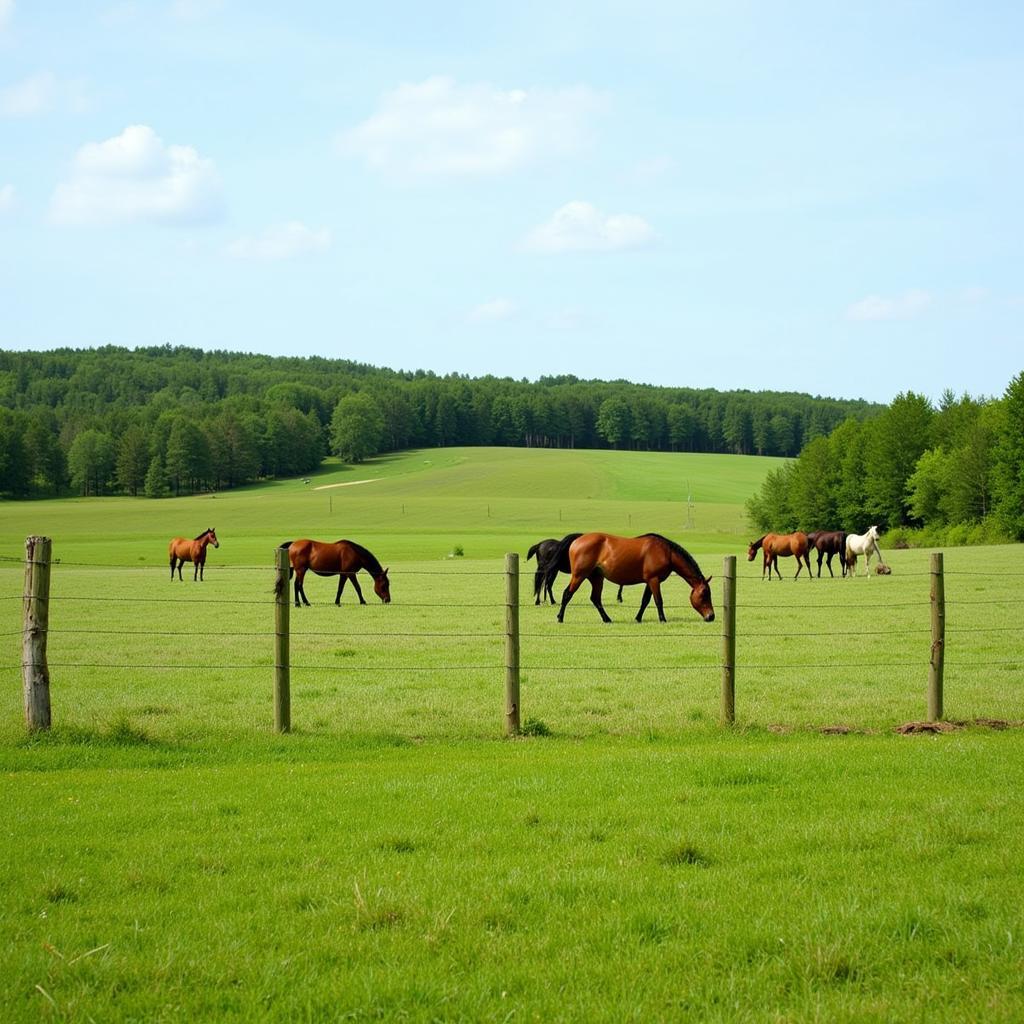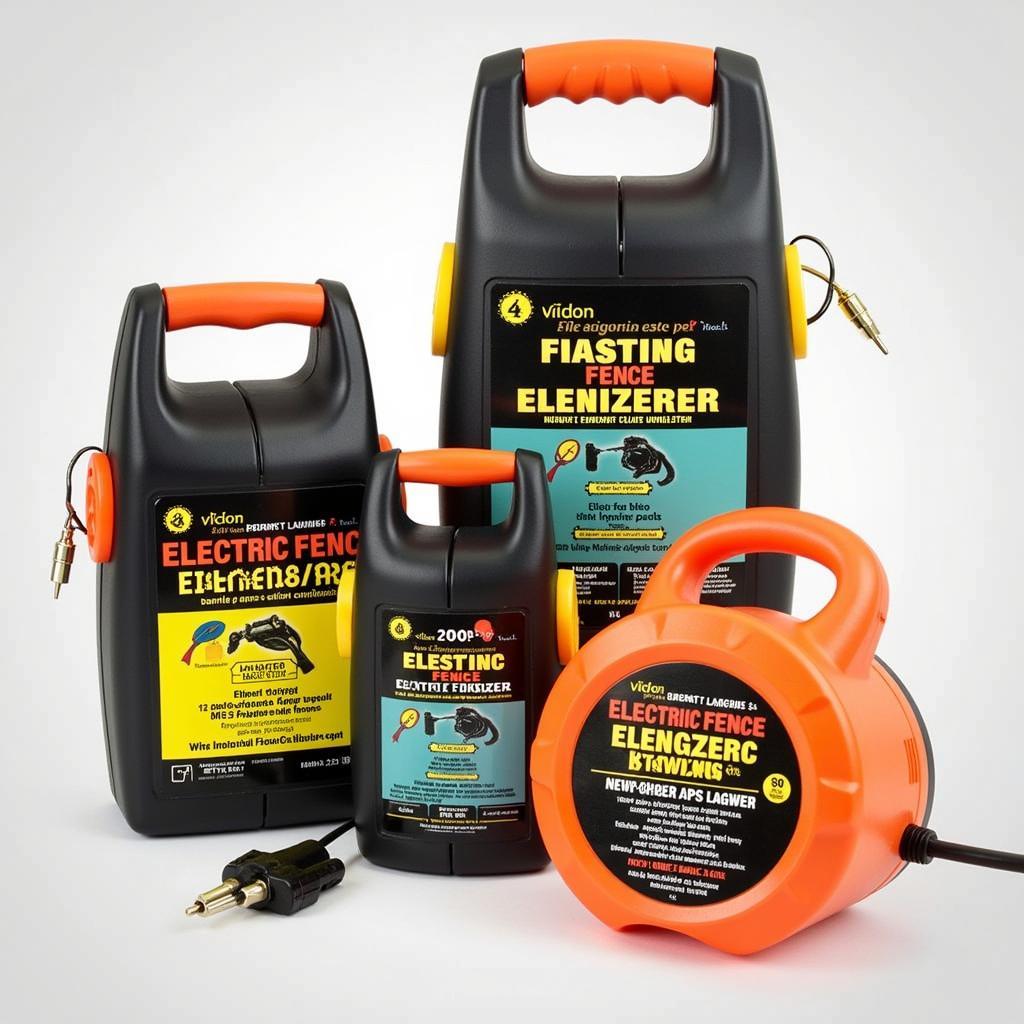Electric fences are a popular and effective way to contain horses while providing them with ample grazing space. When set up and maintained correctly, Electric Fence Horses respect provide a safe and visible boundary, keeping your equine companions secure. This guide will delve into the essential aspects of electric fence horses, empowering you to make informed decisions for your beloved animals.
Understanding Electric Fence for Horses
Unlike traditional fences that rely on height and strength, electric fences use a psychological barrier. A pulsed current runs through the fence wire, delivering a mild but memorable shock when a horse touches it. This shock is designed to startle, not harm, teaching the horse to avoid the fence.
Why Choose Electric Fence for Horses?
 Horses grazing in a pasture enclosed by an electric fence
Horses grazing in a pasture enclosed by an electric fence
- Cost-Effective: Electric fencing is generally more affordable to install and maintain compared to traditional fencing options, especially for large areas.
- Versatility: Electric fences are adaptable to various terrains and can be easily modified to accommodate changes in pasture size or layout.
- Visibility: The thin wires of an electric fence are highly visible to horses, reducing the risk of them running into the fence out of confusion.
- Safety: When installed and maintained properly, electric fences pose minimal risk of injury to horses.
Choosing the Right Electric Fence System for Your Horses
Selecting the appropriate electric fence system is crucial for ensuring both safety and effectiveness. Here’s a breakdown of the key components:
1. Energizer (Fence Charger)
 Different types of electric fence energizers
Different types of electric fence energizers
The energizer is the heart of the system, sending electrical pulses through the fence. Factors to consider when choosing an energizer include:
- Fence Line Length: Longer fence lines require more powerful energizers to maintain adequate voltage.
- Terrain: Hilly terrain may require a more powerful energizer compared to flat land.
- Vegetation: Heavy weed growth can drain power, necessitating a stronger energizer.
- Animal Type: Horses are more sensitive to electrical pulses than some other livestock.
2. Fence Wire
Various types of wire are available, each with pros and cons:
- Poly Wire: Visible, affordable, and easy to install, but less durable.
- High Tensile Wire: Extremely durable and long-lasting, but less visible.
- Rope or Tape: Highly visible and less likely to cause injury, but can be more expensive.
3. Fence Posts
Fence posts provide support for the wire. Choose from:
- Wood Posts: Durable and aesthetically pleasing, but require more maintenance.
- Plastic Posts: Affordable and low-maintenance, but may not be as sturdy.
- Metal Posts: Strong and long-lasting, but can be more expensive.
4. Insulators
Insulators prevent the electrical current from grounding out. Select insulators compatible with your chosen wire and posts.
Installing Your Electric Fence for Horses
Proper installation is paramount for a safe and effective electric fence. Key considerations include:
- Planning: Carefully plan the fence line, considering terrain, water sources, and potential hazards.
- Grounding: Adequate grounding is essential for the fence to function correctly.
- Wire Tension: Maintain proper wire tension to prevent sagging and ensure conductivity.
- Gate Placement: Strategically place gates for easy access to the pasture.
Electric Fence Safety Tips for Horses
- Proper Training: Introduce your horses to the electric fence gradually, allowing them to learn its boundaries.
- Regular Inspection: Inspect the fence regularly for damage, shorts, or vegetation touching the wires.
- Voltage Testing: Use a fence tester to ensure the fence is delivering adequate voltage.
- Warning Signs: Post clear warning signs around the perimeter to alert people to the presence of an electric fence.
Frequently Asked Questions about Electric Fences for Horses
1. Will an electric fence hurt my horse?
A properly installed and maintained electric fence will deliver a brief, startling shock that is unpleasant but not harmful.
2. Can I use an electric fence for horses with other animals?
Yes, but adjust the fence height and voltage to suit the smallest or most sensitive animal.
3. How do I prevent my horse from escaping the electric fence?
Proper training, adequate voltage, and regular fence maintenance are crucial for preventing escapes.
Need Help Choosing the Right Fence?
Contact Justus Horses USA at 0772127271, email us at [email protected], or visit us at QGM2+WX2, Vị Trung, Vị Thuỷ, Hậu Giang, Việt Nam. Our expert team is available 24/7 to provide guidance and support in selecting the perfect fencing solution for your equine companions.
For more information on horse fencing options, explore our articles on electric fence horse, electric fence wire for horses, and electric fence kit for horses. If you’re considering alternative fencing solutions, you may find our resources on poly tape horse fence and horse fence cost helpful.